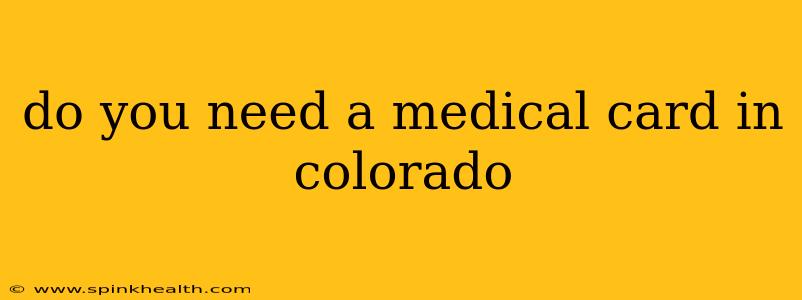Do You Need a Medical Card in Colorado? Navigating the World of Cannabis
The question of whether you need a medical card in Colorado for cannabis is a nuanced one, and the answer isn't a simple yes or no. Let's unravel the complexities surrounding medical marijuana and recreational use in the Centennial State.
My journey into understanding Colorado's cannabis laws began with my own curiosity. I'd heard so many conflicting stories—some saying a medical card was essential, others claiming it was irrelevant. This led me down a rabbit hole of research, digging through state regulations and talking to people with different experiences. What I discovered was fascinating and surprisingly intricate.
Here's what I learned:
You do not need a medical marijuana card in Colorado to purchase and possess cannabis for recreational use. Colorado legalized recreational marijuana in 2012, making it the first state to do so through a voter initiative. This means adults 21 and older can legally purchase a limited amount of cannabis from licensed dispensaries without any need for medical certification.
However, having a medical card does offer certain advantages. Let's explore those.
What are the Advantages of a Colorado Medical Marijuana Card?
Higher Purchase Limits: Can a Medical Card Allow You to Buy More Cannabis?
One of the key differences is the purchase limits. Recreational users face restrictions on the amount of cannabis they can buy at a time. Medical patients, on the other hand, generally have higher purchase limits. This depends on the individual's medical condition and the recommendation from their physician. It's crucial to consult with a doctor and follow all state guidelines.
Lower Taxes: Does a Medical Card Reduce Taxes on Marijuana?
While recreational marijuana is taxed significantly, medical cannabis often comes with reduced or eliminated taxes. This can lead to considerable savings over time, making it a financially attractive option for qualifying patients.
Access to More Products and Stronger Strains: Does a Medical Card Give Access to Stronger Products?
Medical dispensaries sometimes carry a wider variety of strains and products, including those with higher THC content. These may not be available to recreational users or might have restricted access. This increased availability offers patients more options to find the most effective treatment for their conditions.
Home Cultivation: Can I Grow My Own Cannabis With a Medical Card?
In Colorado, medical patients under certain circumstances may be allowed to cultivate their own cannabis. The specific regulations concerning home cultivation are complex and vary based on the individual's situation and the recommendations of their physician.
How Do I Get a Medical Marijuana Card in Colorado?
Obtaining a medical marijuana card involves a process that begins with a consultation with a qualified physician. The doctor will assess your medical condition and determine if you meet the state's eligibility criteria for a medical cannabis recommendation. If approved, you'll receive a recommendation that allows you to register with the state and receive a medical card.
What are the Qualifying Conditions for a Medical Marijuana Card in Colorado?
Colorado's medical marijuana law allows for patients suffering from a range of debilitating conditions to qualify for a medical cannabis recommendation. These conditions include, but are not limited to, chronic pain, cancer, glaucoma, HIV/AIDS, and other serious illnesses that negatively impact quality of life. It's essential to consult with a physician to discuss your specific condition and determine your eligibility.
In Conclusion: Medical vs. Recreational in Colorado
In short, while you don't need a medical card to use cannabis recreationally in Colorado, it offers distinct advantages for those who qualify medically. The decision of whether or not to pursue a medical card hinges on individual circumstances, medical needs, and budget considerations. Always conduct thorough research, consult with a healthcare professional, and adhere to all state regulations regarding cannabis use in Colorado. This information is for educational purposes and is not medical advice.

